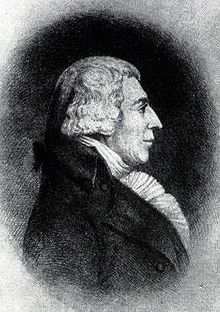Richard Dobbs Spaight
| Richard Dobbs Spaight Sr. | |
|---|---|
 |
|
| 8th Governor of North Carolina | |
|
In office December 14, 1792 – November 19, 1795 |
|
| Preceded by | Alexander Martin |
| Succeeded by | Samuel Ashe |
| Member of the U.S. House of Representatives from North Carolina's 10th district |
|
|
In office December 10, 1798 – March 3, 1801 |
|
| Preceded by | Nathan Bryan |
| Succeeded by | John Stanly |
| Personal details | |
| Born |
March 25, 1758 New Bern, Province of North Carolina, British America |
| Died | September 6, 1802 (aged 44) New Bern, North Carolina, U.S. |
| Political party | Democratic-Republican |
| Spouse(s) | Mary Leach |
Richard Dobbs Spaight (March 25, 1758 – September 6, 1802) was the eighth Governor of the American State of North Carolina from 1792 to 1795.
Spaight was born in New Bern in the Province of North Carolina, the son of the Secretary of the Crown in the colony. Orphaned at the age of eight, Spaight was sent to attend school in Ireland and later graduated from the University of Glasgow.
In 1778, Spaight returned to North Carolina and served as an aide to General Richard Caswell during the American Revolutionary War until 1781.
The General Assembly elected Spaight a delegate to the Confederation Congress between 1782 and 1785; he then served in the North Carolina House of Commons from 1785 to 1787, and was named Speaker of the House. In 1787, Spaight was a delegate to the Philadelphia Convention that drafted the U.S. Constitution, and he signed the document when he was only 29 years old.
On March 24, 1788, Spaight married Mary Leach; Mary had the distinction of being the first lady to dance with George Washington at a ball in Washington’s honor at Tryon Palace in New Bern in 1791.
Under the North Carolina Constitution of 1776, Spaight was nominated for Governor in 1787, but was defeated by a majority in the General Assembly; he was nominated for the United States Senate in 1789 and was again defeated. In 1788, he was a member of the state convention which voted not to ratify the United States Constitution, although Spaight himself supported ratification.
...
Wikipedia
